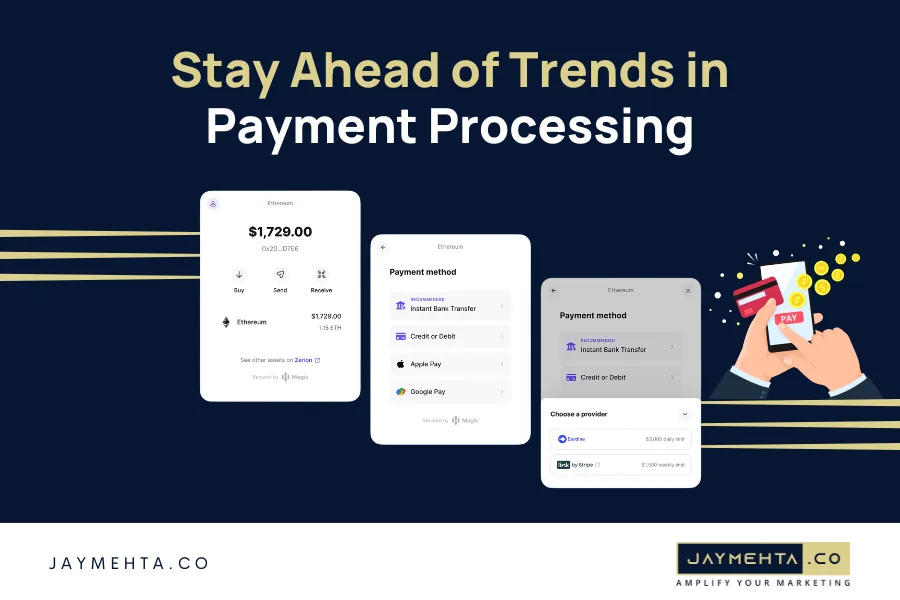The digital payment landscape is undergoing rapid transformation, with cryptocurrencies emerging as a key player in the e-commerce space. In a significant move, Stripe has reintroduced cryptocurrency payments, a decision that reflects the growing acceptance of digital currencies in mainstream commerce.
This blog will explore the implications of Stripe cryptocurrency payments for merchants and the overall e-commerce landscape. We will discuss the types of cryptocurrencies supported by Stripe, the integration processes for businesses, and the potential benefits that come with accepting crypto payments.
The Evolution of Cryptocurrency Payments
Cryptocurrencies like Bitcoin have evolved from being niche financial instruments to becoming mainstream payment options. Since Bitcoin’s launch in 2009, digital currencies have gained widespread acceptance due to their decentralized nature, security features, and ability to facilitate cross-border transactions without intermediaries.
Stripe initially supported Bitcoin payments in 2014 but discontinued the service in 2018 due to scalability issues and high transaction fees at the time. However, with advancements in blockchain technology and growing consumer demand for crypto payments, Stripe has reintroduced this feature, signaling a new era for digital commerce.
Benefits of Using Stripe for Crypto Transactions
-
Expanding Customer Reach
One of the most significant advantages of adopting Stripe cryptocurrency payments is the ability to attract a broader customer base:
-
Attracting Younger Consumers
Millennials and Gen Z are more likely to use cryptocurrencies than older generations. By accepting crypto payments, businesses can tap into this valuable demographic.
-
Global Accessibility
Cryptocurrency transactions can be completed without currency conversion fees or international transaction charges. This allows businesses to sell to customers worldwide without additional costs.
By leveraging Stripe’s crypto functionality, merchants can position themselves as forward-thinking brands that embrace innovation.
-
-
Lower Transaction Costs

Traditional payment methods often come with high transaction fees that can eat into profit margins. With Stripe’s crypto processing:
-
Reduced Fees
Cryptocurrency transactions typically involve lower fees compared to credit card processing.
-
No Chargebacks
Unlike credit card payments that can result in chargebacks (where customers dispute charges), cryptocurrency transactions are irreversible once confirmed on the blockchain. This eliminates the risk of losing revenue due to fraudulent chargebacks.
These cost-saving benefits make Stripe cryptocurrency payments an attractive option for businesses looking to optimize their payment systems.
-
-
Enhanced Security Features
Security remains a top priority for online transactions. Stripe’s crypto processing offers robust security measures:
-
Blockchain Technology
Transactions are recorded on a decentralized ledger, making them tamper-proof and resistant to fraud.
-
Instant Settlements
Crypto payments are processed almost instantly, reducing the risk of delays or errors associated with traditional banking systems.
These features not only protect merchants but also enhance customer trust in your business.
-
Types of Cryptocurrencies Supported by Stripe
Stripe supports several popular cryptocurrencies to provide flexibility for both merchants and customers:
-
Bitcoin (BTC)
Bitcoin is the most widely recognized cryptocurrency.
-
Ethereum (ETH)
Ethereum is known for its smart contract capabilities.
-
Stablecoins (e.g., USDC)
These are pegged to fiat currencies like USD, providing stability and reducing volatility concerns.
-
Others
Depending on demand and market trends, Stripe may expand its list of supported cryptocurrencies.
By offering multiple options, Stripe ensures that businesses can cater to diverse customer preferences.
Integrating Crypto Payments into E-Commerce with Stripe
One of Stripe’s strengths lies in its user-friendly integration process. Here’s how businesses can start accepting crypto payments:
-
Set Up a Stripe Account
If you don’t already have one, create an account on Stripe.
-
Enable Crypto Payments
Navigate to your dashboard and enable cryptocurrency as a payment option.
-
API Integration
Use Stripe’s API documentation to integrate crypto functionality into your e-commerce platform (e.g., Shopify or WooCommerce).
-
Test Transactions
Conduct test transactions to ensure everything is functioning correctly before going live.
The seamless integration process allows businesses to adopt cryptocurrency payments without requiring extensive technical expertise.
Merchant Experiences with Crypto on Stripe

Merchants who have adopted Stripe cryptocurrency payments report several positive outcomes:
-
Increased Sales
Businesses have seen an uptick in sales after introducing crypto as a payment option.
-
Improved Customer Satisfaction
Offering multiple payment methods enhances the shopping experience for customers.
-
Brand Differentiation
Accepting cryptocurrencies helps businesses stand out as innovative and tech-forward brands.
These experiences underscore the potential benefits of integrating crypto payments into e-commerce strategies.
Comparison with Other Payment Processors
Stripe isn’t the only player in the cryptocurrency payment space. Here’s how it compares with other popular processors:
Feature |
Stripe |
Coinbase Commerce |
BitPay |
| Supported Cryptocurrencies | Bitcoin, Ethereum, Stablecoins | Bitcoin, Ethereum | Bitcoin, Ethereum |
| Integration Ease | Seamless API | Requires setup knowledge | Moderate complexity |
| Conversion Options | Instant fiat conversion | Manual conversion | Instant fiat conversion |
| Fees | Competitive | Low | Low |
While competitors like Coinbase Commerce and BitPay also offer robust features, Stripe’s seamless integration with existing platforms gives it an edge for businesses already using its services.
Regulatory Implications for Crypto Payments
Merchants must navigate regulatory considerations when adopting cryptocurrency payments:
-
Compliance Requirements
Ensure adherence to local laws governing digital currencies.
-
Tax Reporting
Cryptocurrencies are often treated as assets for tax purposes. Businesses must report gains or losses from crypto transactions accurately.
-
AML/KYC Policies
Implement anti-money laundering (AML) and know-your-customer (KYC) protocols to mitigate risks associated with illicit activities.
Consulting legal experts familiar with cryptocurrency regulations can help businesses avoid compliance pitfalls.
Future Trends in Payment Processing

The reintroduction of crypto payments by Stripe is part of a broader shift in the payment processing landscape. Here are some trends shaping the future:
-
Mainstream Adoption of Cryptocurrencies
As more consumers become comfortable using digital currencies, businesses that accept them will gain a competitive edge.
-
Integration with Traditional Financial Systems
Banks and financial institutions are exploring ways to incorporate cryptocurrencies into their services.
-
Advancements in Blockchain Technology
Innovations like smart contracts could further streamline e-commerce processes by automating tasks such as order fulfillment or dispute resolution.
Staying ahead of these trends will position your business favorably within an ever-changing marketplace.
The Impact on Online Sales
By enabling crypto payments through Stripe, businesses can experience a direct impact on their online sales:
-
Higher Conversion Rates
Offering flexible payment options reduces cart abandonment rates.
-
Improved International Sales
Cryptocurrencies eliminate barriers associated with cross-border transactions.
-
Enhanced Customer Loyalty
Tech-savvy customers are more likely to return to businesses that align with their preferences.
These benefits highlight why adopting crypto payments is a strategic move for e-commerce success.
Real-Life Case Studies: Success Stories from Merchants Using Stripe Crypto Payments
To illustrate the tangible benefits of accepting cryptocurrency through Stripe, let’s take a look at some real-life case studies from merchants who have successfully integrated this payment method:
-
E-Commerce Fashion Brand
A popular fashion retailer reported a 15% increase in sales after implementing Stripe’s cryptocurrency payment option. The brand noticed that younger customers preferred using Bitcoin over traditional credit cards due to perceived security and privacy benefits.
Additionally, they found that international customers were more willing to make purchases when they could pay with crypto instead of dealing with currency conversion fees associated with traditional methods.
-
Tech Gadget Store
A tech gadget store specializing in cutting-edge electronics began accepting Ethereum through Stripe’s platform. They found that tech-savvy consumers were more inclined to make larger purchases when given the option to pay with crypto.
The store reported not only increased sales but also enhanced customer loyalty as many repeat customers expressed appreciation for having diverse payment options available during checkout.
-
Online Gaming Platform
An online gaming platform integrated Stripe’s cryptocurrency processing capabilities and saw immediate results—transaction volumes increased by over 30% within three months of launching the feature.
Players appreciated being able to use their digital assets directly instead of converting them back into fiat currency first—this streamlined process led to higher engagement levels among users who favored using cryptocurrencies for gaming purchases.
These case studies highlight how integrating cryptocurrency payments can lead directly towards enhanced sales performance while fostering stronger relationships between brands and their audiences alike!
Conclusion
The reintroduction of Stripe cryptocurrency payments marks a significant shift in how merchants can approach online sales. By embracing this innovative payment solution, businesses can unlock new opportunities for growth while catering to an increasingly tech-savvy customer base.
At Jay Mehta Digital, we are committed to helping businesses navigate the complexities of digital payments. Our team offers expert guidance on integrating Stripe’s crypto solutions into your e-commerce strategy effectively. Partner with us today to elevate your payment processing capabilities!
FAQs
What are the most important SEO trends for 2025?
Stripe supports popular cryptocurrencies like Bitcoin (BTC), Ethereum (ETH), and stablecoins like USDC.
How do I integrate Stripe’s crypto payments into my e-commerce site?
You can easily set up a Stripe account and follow their integration guidelines to enable cryptocurrency payments.
What are the benefits of using Stripe for crypto transactions?
Benefits include lower transaction fees, enhanced security features, and access to a broader customer base.
How does Stripe compare to other payment processors for crypto?
Stripe offers seamless integration with existing platforms and competitive fees compared to other processors like Coinbase Commerce or BitPay.
What should I consider regarding regulatory compliance when accepting crypto?
Ensure compliance with local laws governing cryptocurrency transactions and consult legal experts if necessary.











